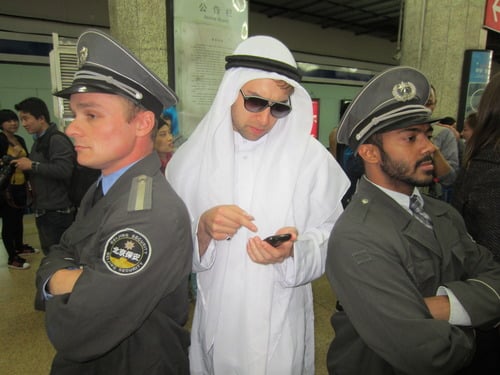The guards never seem to be too busy, but they are always present, even if they’re sleeping. They sometimes direct cars that are parking or provide directions. Every now and then, a news story will appear showcasing a guard who went out of his or her way to save a life or prevent a theft.
In order to secure their costumes, Jared and Sumanth went on an adventure across Beijing, buddying up to security guards, trying to explain Halloween customs, and getting weird looks.
Prone to getting lost and confused, I had many of my first “real-life” Chinese conversations with security guards. In poor Chinese, I would inquire, “How to go subway?” “Where library building?” and sometimes end up in 20-minute conversations about international politics or American food. I bet many non-native Chinese speakers have had similar experiences. Security guards add to our formative experiences of China, and become one of the most recognizable features of any urban place across the country. They are often friendly towards foreigners, interested to chat, even if they have pretty hawkish opinions about the outside world.
But the Chinese security guard industry, as you might expect, isn’t all glamour and negotiating with crazy foreigners. It’s actually an enormous industry in China, with its own history, norms, and regulations.

As Jared was waiting to meet Sumanth near Beijing’s Sanlitun, he found some nearby security guards and made his pitch: “By dressing as a security guard for Halloween, I want to represent the modern side of Beijing.”
His savvy appeal played on the infamous Beijinger pride. Anyone who has lived in the Northern Capital knows that if you compliment Beijingers on their city, they will do whatever you want. I’ve even gotten out of arguments with my girlfriend (a Beijinger) by extolling Beijing as the only place in China where every variety of Chinese food is just a subway stop away.
The guards were happy to hear it and grabbed their supervisor, a well-dressed Laoban-type (boss). By this time, Sumanth arrived, and they began in earnest to explain Halloween and how their costumes would help foreigners from across the globe understand Beijing’s greatness and modernity.
Once again, it worked like a charm. The boss readily agreed and started making calls. He had to reach out to the Hebei office for permission, and came back with status updates every few minutes. With a little bit of bargaining from Sumanth, the two were soon on their way with brand new, official Beijing security guard outfits. Success.
Happy Halloween, and let’s hope Jared and Sumanth can live up to the name of 保安!
在北京居住的两个美国朋友最近告诉我他们今年怎样得到了他们的万圣节服装。不想打扮成总统候选人或“江南Style”里的Psy,Jared(左边)和Sumanth(右边)决定换种路线。他们将打扮成中国社区里的保安,字面上的意思是保卫平安,他们无处不在,基本上都是男士,穿着制服,坐在几乎每个中国社区或办公楼的外面。这些保安似乎不太忙,但他们一直都在,甚至睡觉的时候。他们有时指挥车辆停车或给他们指路。偶尔,会有新闻报道说某个保安救了一个人或抓住了一个贼。
为了得到制服,Jared和Sumanth走遍了北京,跟保安们打交道,努力解释万圣节服装的用意,回应他们的总是奇怪的目光。
因为我容易迷路或疑惑,我有很多次自身与中国保安聊天的体验。说着蹩脚的中文,我会问:“怎么走地铁站?”“哪里图书馆?”但有时最后却跟他们聊天达20分钟之久,话题通常关于国际政治或美国食物。我想很多非中国本土居民都有类似的经历。保安增加了我们对中国的认知,成为中国各个城镇的最具特点的象征之一。他们通常对外国人很友好,很感兴趣与你聊天,尽管他们对外面的世界有着很强硬的观点。
但是中国的保安行业,可能你会发现,不是很有魅力或一直与疯狂的外国人打交道。它实际上是中国的一个巨大行业,有自己的历史、标准和规范。
Jared等着与Sumanth在北京三里屯见面时,看到了附近的几个保安,他做了提议:“我想要在万圣节穿着保安制服,我想要展现北京现代化的一面。”
他正是用机智抓住了北京人臭名昭著的骄傲的一面。任何一个在这北方首都居住过的人都知道,如果你赞美北京,北京人会愿意做任何事情。我就是这样跟我女朋友(北京人)解除矛盾的,我说北京是中国惟一一个能在一站地铁站内找到任何中国特色食物的地方。
这些保安们听到后很高兴,他们带来他们的领班,一个穿着讲究的老板人物。这时候,Sumanth来了,他们开始热切地解释万圣节和他们的服装会如何帮助来自世界各地的外国人理解北京的伟大和现代化。
又一次,这个咒语起作用了。这位老板同意了,并开始打电话。他打电话到河北办公室请求批准,每几分钟就带来一些进展。Sumanth跟他们讲情,很快,这两个人就拿到了全新的官方的北京保安制服。成功。
万圣节快乐,让我们期待Jared和Sumanth不辜负保安的头衔!



